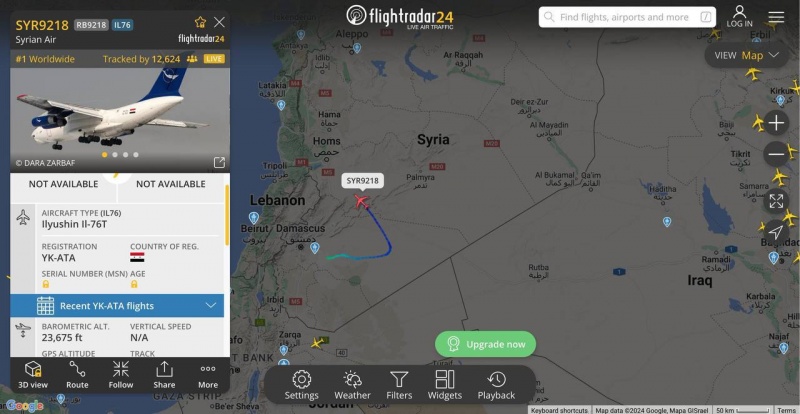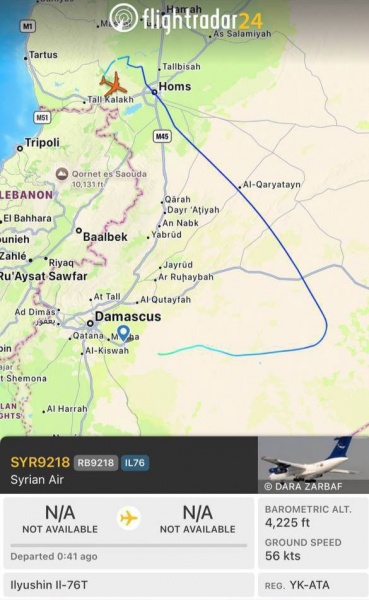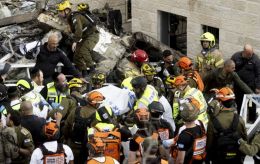Syrian rebels enter Damascus, Assad flees capital
 Bashar al-Assad, President of Syria (photo: Getty Images)
Bashar al-Assad, President of Syria (photo: Getty Images)
Syrian rebels entered the capital, Damascus, on December 8, encountering no signs of military deployment. President Bashar al-Assad reportedly left Damascus aboard a plane, heading to an undisclosed location, according to Reuters and CNN.
After seizing control of the strategic city of Homs, Syrian rebels advanced toward the capital, Damascus, and began entering the city on Sunday.
The rebels announced they were celebrating the news of the liberation of our prisoners, the removal of their chains, and the declaration of the end of the era of injustice at Sednaya prison.
Residents of Damascus told Western media that gunfire was heard in the city center, although the cause remains unclear.
Following the withdrawal of government forces from key cities in Syria over just a week and the capture of dozens of towns, the rebels stated they are advancing toward the capital, including President Assad's residence.
According to two high-ranking Syrian military officers who spoke to Reuters, President Bashar al-Assad left Damascus. It is reported that Assad used an aircraft to leave the capital on Sunday, heading to an unknown destination.
Witnesses stated that thousands of people gathered in the main square of Damascus, waving their hands and chanting Freedom.
Preliminary information suggests that Assad may have been aboard a Russian Il-76T aircraft. Meanwhile, according to the Flightradar service, an Il-76T disappeared from radar in Syria on Sunday for unknown reasons, possibly near Al-Suwaira.


The General Staff of the Syrian Arab Army has reportedly informed its soldiers about the fall of President Assad's regime and ordered them to lay down their weapons.
A Syrian officer told Reuters that the Syrian Arab Army Command informed its officers that Bashar al-Assad's rule has ended following the rapid advance of the rebels.
Meanwhile, Syrian rebels have declared the success of the revolution. Opposition representatives added that they promise to turn the country into a democratic state, respect property rights, preserve the territorial integrity and sovereignty of Syria, and hold Assad's regime accountable.
The rebel forces in Syria also declared Damascus free from the tyrant Bashar al-Assad. This was reported in a Telegram channel by the Military Operations Command (rebel forces).
Before this, the rebels stated that they had begun taking control of the offices of state-run media in Damascus to broadcast announcements about the victory over Assad.
Situation in Syria and the rapid rebel campaign
Earlier, it was reported that Syrian rebels entered Homs on Sunday and announced that they had taken full control of the city. They also shared their plans to move towards the capital.
It is important to note that the rapid advance of rebel groups in Syria began about a week and a half ago. They were able to quickly capture key cities such as Aleppo, Hama, and others, including advancing towards Damascus.
The Syrian rebel coalition consists of Islamist and moderate factions, which, despite their differences, have united in the fight against Assad's regime, the terrorist organization ISIS (Islamic State), and Iran-backed fighters.
The main force among the rebels is the group Hayat Tahrir al-Sham (HTS), which is believed to have support from Türkiye.
At the same time, Assad's main allies, Russia and Iran, have not provided real assistance in containing the rebel advance. Reports indicate that Russian and Iranian military personnel are evacuating from Syria.
Officials in the Biden administration have suggested that the Assad regime could fall within a few days due to the rapid progress of the rebels.
On December 7, it was reported that in a suburb of Damascus, a statue of Assad's late father, President Hafez al-Assad, was toppled and shattered.
Additionally, on Saturday, Syrian rebels claimed they were attempting to encircle the capital.
The Syrian army asserted that it was strengthening its position around Damascus, and state television reported on Saturday that Assad remained in the city. However, Western media outlets suggested that the Syrian president had likely fled the capital.
According to Bloomberg, Assad reportedly sought help through intermediaries from the US and former President Donald Trump, in an attempt to either remain in power or secure an agreement for a safe exile if necessary.

